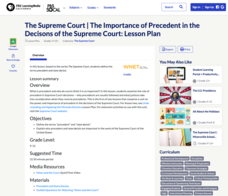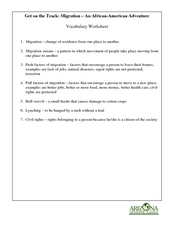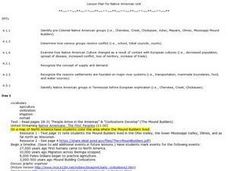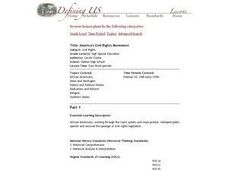Judicial Learning Center
State Courts vs. Federal Courts
Popular culture often portrays the Feds as the most fearsome of law enforcement agencies. Yet, someone charged with a crime is considerably more likely to end up in a state court. The lesson, one of six covering the Organization of the...
PBS
The Supreme Court: The Importance of Precedent in the Decisions of the Supreme Court
People often hear the words precedent and Supreme Court together, but why? A resource on the Supreme Court includes a variety of discussion questions, handouts that guide young historians, a video about Nixon and the court system, and...
Curated OER
Federal Court Systems and Court Cases
Ninth graders investigate the basis for the Common Law Tradition. They examine the organization of the Federal Court System and students identify the various sources of the American Law.
School Improvement in Maryland
Court Proceedings Civil Cases
What's the difference between civil and criminal law? How do the court proceedings differ in these two types of trials? How do the standards of proof differ? Why do these differences exist? As part of their examination of the US court...
DocsTeach
Court Packing vs. Reorganizing: The Supreme Court in the New Deal
Travel back in time to understand the effects of FDR's New Deal on the Supreme Court. Academics analyze historical documents to understand FDR's attempts to pack the Supreme Court and the opposition he faced. The activity includes a...
Curated OER
The Supreme Court: The Judicial Power of the United States
Students investigate some basic facts about the Supreme Court by examining the United States Constitution and one of the landmark cases decided by that court. The operation of the Supreme Court forms the focus of the lesson.
Curated OER
Indiana Courts: How Do They Work?
Students identify the branches of Indiana's judicial system and determine the differences between the different courts and different types of cases. Students create a flow chart showing how a court case works its way through the legal...
Curated OER
American History Through the Len of the Supreme Court Decisions
Students examine the historical background of Supreme Court decisions and the basic principles behind legislation. As part of the lesson plan, students discover legal concepts and terms and write sentences using the vocabulary they have...
Curated OER
Migration: An African American Adventure
Learners read the book, The Great Migration by National Geographic, then complete this set of related worksheets. They review vocabulary, complete five short answer questions, discuss push and pull factors for the migration, then write a...
Curated OER
The Supreme Court: The Judicial Power of the United States
Middle schoolers learn basic facts about the Supreme Court by examining the United States Constitution and one of the landmark cases decided by that court.
Curated OER
Supreme Court Decisions and Their Effect On Us
Consider five Supreme Court cases and how their outcomes have directly affected the American population. Government students research and compose a 1-2 page pager outlining the examples of our daily life that have specifically been...
Curated OER
The Role of the Judiciary in a System of Separation of Powers and Checks and Balances
Students determine the difference between the different branches of government and assess the role of each within the American governmental system.
Teaching Tolerance
Racial Disparity in the Criminal Justice System
Explore the impact of the war on drugs in a thought-provoking lesson for high school academics. Young historians delve into the world of the criminal justice system and the racial disparity that occurs in the US. The resource provides...
School Improvement in Maryland
Supreme Court Case Overview I
As part of a study of the 14th Amendment to the United States Constitution, class members examine four Supreme Court decisions—Gitlow v. New York, Mapp v. Ohio, Gideon v. Wainwright, and Griswold v. Connecticut—that incorporated the due...
Judicial Learning Center
Civil Rights and Equal Protection
Almost every American is familiar with the Supreme Court case of Brown vs. Board of Education. Far fewer understand the constitutional reasoning or the wide-ranging consequences of the ruling in the field of criminology. The interesting...
Judicial Learning Center
Your 4th Amendment Rights
Americans love to learn about their rights, especially those that protect them from the government's power to invade their privacy. Young people are especially engaged by this topic. An informative lesson explores four Supreme Court...
Curated OER
The Legacy of the Warren Court
Students examine the major decisions by the Supreme Court when Warren was the Chief Justice. In groups, they research the life and other works of Earl Warren and discuss how ones background can influence decisions. They also examine...
Curated OER
How the Court Became Supreme
Students investigate how the Supreme Court changed under the leadership of John Marshall. In this Supreme Court lesson, students recognize the role of the Supreme Court as well as the significance of Marbury v. Madison. Students also...
Curated OER
Black Skin, White Justice: Race Matters in the Criminal Justice System
Students examine the effects of race in the criminal justice system. As a class, they brainstorm a list of instances when the offender has been an African American and he is not treated fairly in court based on his race. They analyze...
Curated OER
Pre-Colonial Native American Groups
Students investigate U.S. history by researching the Internet and taking a test. For this American Indian group lesson, students identify the many specific Native American tribes and their geographic locations. Students research the web...
DocsTeach
Alfred Sinker and the Writ of Habeas Corpus in 1861
Scholars learn how the judicial system treated under-age Civil War soldiers using historical analysis. The resource uses court documents to help historians understand why Habeas Corpus was used in the case of Alfred Sinker and why he was...
Curated OER
America's Civil Rights Movement
Eleventh graders explore, analyze and study the background to America's Civil Rights Movement through the court system, mass protest, public opinion, political cartoons and legislation. They research Rosa Parks, Brown vs. Board of...
Curated OER
It's Your Right: A Civil Rights Brochure
Learners examine the US Constitution, Bill of Rights, and Supreme Court cases in order to broaden their understanding of the US Judicial System. They research a variety of textual and Internet resources to create a tri-fold brochure,...
Curated OER
For The Sake Of Security: U.S.A. Patriot Act & Bill of Rights
A substantive New York Times article about the U.S.A. Patriot Act, military tribunals, racial profiling, and the Bill of Rights forms the basis for a discussion of the complex interplay of fundamental American rights and the aftermath of...

























